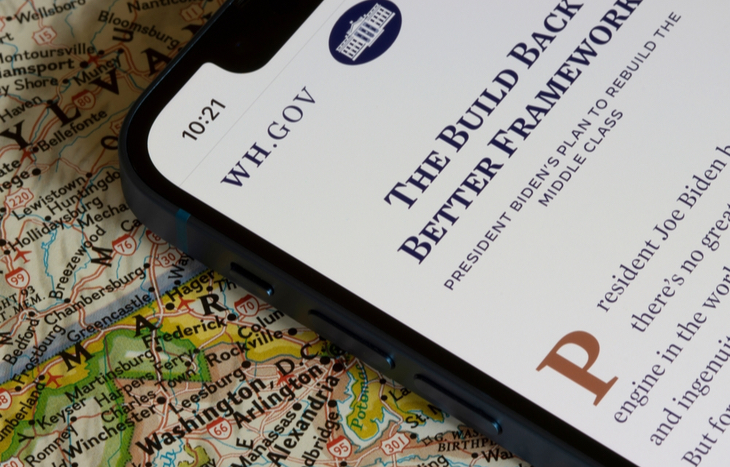Infrastructure Investment and Jobs Act: Stock Market Guide
The Infrastructure Investment and Jobs Act was passed last year as part of the President’s Build Back Better plan. Accordingly, the new bill authorizes funds to stimulate new building and restore America.
The infamous “infrastructure week” finally holds true to its promise to start building. In November, HR 3684, also known as the Infrastructure Investment and Jobs Act, was signed into law with both party’s support.
Above all, the bill intends to create jobs while stimulating the U.S. economy for years. At the same time, the jobs act may have bigger effects on the stock market and your portfolio. Learn more about the Infrastructure Investment and Jobs Act and how it could affect your portfolio below.

What Is the Infrastructure Investment and Jobs Act?
The Infrastructure Investment and Jobs Act (IIJA) is a $1.2 trillion bill passed into law in 2021. The administration calls it as a “once-in-a-generation investment.” And the largest of its kind in U.S. history.
With this in mind, the jobs act sets aside funds to advance several issues pressing the economy. For example, the bill (with Build Back Better) expects to add 1.5 million jobs every year until at least 2032.
The historic investment in America focuses on improving several aspects of the economy holding the nation back. By providing everyone with an opportunity, the country can advance as a whole.
Adam Smith, the ‘father of economics,’ famously said, “A nation is not made wealthy by the childish accumulation of shiny metals, but it enriched by the economic prosperity of its people.” While this may be true, with soaring inflation and an already huge deficit, will the bill do as it intends?
Where Are the Funds Going?
Below you will find a quick breakdown of the Infrastructure Investment and Jobs Act and where the funds are going.
- $110 billion: Repair and rebuild roads and bridges. It also includes funds for other major projects to reduce accidents.
- $73 billion: Funding to improve the electric grid and promote clean energy.
- $66 billion: Railroad and freight funding to end Maintenance backlog and upgrade the network.
- $65 billion: Broadband deployment to ensure every American has access to high-speed internet. It will also help lower service prices to make the internet more affordable.
- $55 billion: Replace and rebuild lead water pipes to support clean drinking water.
- $50 billion: To protect against the impacts of climate change such as droughts, fires, and floods. Moreover, the bill includes funds for protecting against cyber-attacks.
- $42 billion: Airport improvements for runways, gates and terminals to improve air traffic.
- $39 billion: Public transit upgrades, including multi-billion-dollar repairs and signal replacements.
- $15 billion: To promote EV adoption, including funds to build a national EV charger network. Furthermore, half of the funds are replacing school buses with zero-emission, clean energy buses.
As you can see, the bill aims to close the widening income gap in America by providing equal access opportunities. Furthermore, the jobs act intends to ease supply chain issues, a key driver of inflation.
Will the Infrastructure Investment and Jobs Act Affect the Stock Market?
With an influx of money, several industries will likely see a boost in demand from the jobs act. For one thing, the infrastructure investment and jobs act injects $1.2 trillion into the economy over the next five years. With this in mind, the investment is the largest spending on rebuilding in decades.
Chief economist at Moody’s Analytics, Mark Zandi, says, “increasing infrastructure investment has significant macroeconomic benefits.” Citing positive effects on GDP and employment in the long run. If the bill helps stimulate growth, you can expect a few sectors and specific industries to benefit.
- Materials: With the most significant funds for building and improving roads and bridges, materials can see a big boost in demand. More importantly, the White House requires all funds to be used on U.S. materials. For example, all iron, steel, manufactured products and construction materials will need to be domestic.
- Transportation: The transportation sector is another area of focus with funding for railroads, ports and public transit. Not to mention the clean energy upgrades for buses.
- Construction & Engineering: A good part of the 1.5 million jobs will be in the construction and engineering industries. With more output and government help, we could see profits rise.
- Electric Vehicles: To boost EV adoption, the bill aims to create a national EV charging network. With this in mind, the investment can encourage more people to consider buying EVs.
- Renewable Energy: The bill is a big win for renewable energy with $65 billion in funding to expand clean energy options.
Another key thing to consider is long-term trends. The IIJA lays the groundwork for a cleaner, more resilient future.
How Will It Be Paid For?
A major concern people have with the Infrastructure Investment and Jobs Act is the amount of money. For one thing, over $4.6 trillion has been spent so far in response to the pandemic. So, it’s reasonable to be skeptical of another massive spending bill.
But the administration has several ideas to pay for the spending. Here are a few estimates…
- About $210 billion in unused COVID-19 relief funds.
- $56 billion in economic growth assuming a 33% ROI.
- $53 billion from states unused federal UI supplement.
- $51 billion from delaying Medicare Part D rebate.
- $28 billion in fees from cryptocurrency
- $21 billion from higher GSE fees.
- $14 billion from reinstating superfund fees.
- $6 billion in sales from strategic oil reserves.
Furthermore, the broader agenda plans to raise taxes on corporations and high earners. As a result, the lower and middle class should benefit.
Infrastructure Investment and Jobs Act Summary
The Infrastructure Investment and Jobs Act is another step in President Biden’s Build Back Better plan. The new bill calls for a slew of new funds and programs to boost the economy while setting America on a path for sustained growth.
Through these new investments, several industries will see an influx of cash. For example, U.S. materials companies producing steel, iron, and other construction parts will likely see higher demand. On top of this, the bill advances issues like clean drinking water and internet access to provide equal opportunities to rural areas.
Will the new jobs act do as it intends and stimulate the economy? Or will it add further fuel to the fire known as inflation? So far, economists expect mild results, slight to no growth and little debt added.
[adzerk-get-ad zone="245143" size="4"]About Pete Johnson
Pete Johnson is an experienced financial writer and content creator who specializes in equity research and derivatives. He has over ten years of personal investing experience. Digging through 10-K forms and finding hidden gems is his favorite pastime. When Pete isn’t researching stocks or writing, you can find him enjoying the outdoors or working up a sweat exercising.





